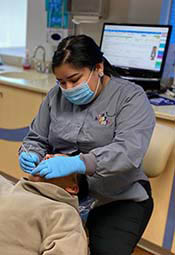Oral health education for kids is important for instilling healthy habits that can last through adulthood. This includes not only the right way to brush and floss but also tips and tricks to get kids excited about caring for their teeth.
As a parent or teacher, you might have a lot of questions about oral health education for kids: When should you start teaching your kids about oral hygiene? Exactly how much do they need to know? What about tooth decay in kids? What do you do about kids’ cavities? Most importantly, how can you make sure that information actually sticks?
Here are a few resources to get you started in your quest to educate your kids about their oral health:
When Should You Start Teaching Kids About Oral Health? Now!
Unless your child has issues with her teeth or gums, your dentist will probably recommend her first dental check-up when she turns 2 or 3 years old.
However, you can and should start practicing oral hygiene long before her baby teeth break through! Experts recommend starting oral health education for children at birth, but also reinforcing it strongly again in first grade when they are beginning to take over this responsibility.
Think about how impressionable young kids are, and how eager they are to learn new things, especially skills that make them feel like big kids. That includes things like brushing teeth, flossing, and using a rinse! The earlier you train them to take care of their teeth, the more instinctive it will become. Then, instead of resisting it, your kids will take it as a natural part of their day.
Keep Your Family’s Smile Bright and Healthy
Schedule An Appointment With Our Team
Oral Health Education for Kids: What to Cover
Just as it’s never too early to start educating your kids about dental health, there is never “too much” you can expose them to. Younger children tend to learn through repetition and practice, so the more you can teach them, and teach them again and again, the better.
Granted, you will want to give your kids information that is appropriate for their age. If your kids cannot easily understand enjoy what you are teaching about oral health, they will likely ignore that information and resist doing things the correct way.
Start with the Basics
- Start by telling your kids why taking care of your mouth is so important. Even small children can understand kid’s cavities and oral decay. Once they learn about them, they will want to prevent cavities and decay. If your kids are a little older, you can start teaching them about other health conditions affected by oral health, such as heart disease and diabetes.
- Help them understand what healthy teeth look like, and what could be signs of trouble. This will help them take responsibility for their own teeth and could also help catch problems before they become painful or expensive.
- Teach them proper oral hygiene skills. These include the proper ways to brush and floss, and when to use mouthwash.
- Set a good example by using these skills regularly yourself!
- Teach them about the link between diet and oral health. For example, point out why it’s good to eat nutritious foods instead of sugary snacks, and why we should drink plenty of water.
- Look for bad habits, and try (gently) to correct them. Bad habits now can lead to problems later – nip those in the bud now, before they become too ingrained!
Remember, children are concrete thinkers. Try to show more than you lecture, and provide details when possible. You will be surprised at how much even your preschooler will remember about teeth. And just like grown-ups, when they know what they’re doing supports a good purpose, they don’t mind doing it as much.
Continuing Oral Health Education for Your Kids
Here at MyOrthodontist, we take pride in being a great practice for dentistry for kids. And we often write about children’s dental health. So, you can start gathering information simply by browsing our blog and subscribing to our newsletter.
For more tips, plus videos, games, and puzzles, check out the resources at mouthhealthykids.org. This site is run by the American Dental Association (ADA) and provides a lot of great expert advice in a way kids can understand.
If you are a teacher or group leader, there are some great videos and activities provided by the Colgate company. Parents, too, can find a lot of useful information on their website. While Colgate is interested in selling toothpaste, their materials are very much focused on the health aspects of dental health and dentistry for kids.
Visit MyOrthodontist
Finally, we realize that you might have specific questions that you want to ask a dentist in-person. If you live in North Carolina, we suggest you contact us and make an appointment so that we can talk. If you live elsewhere, try the American Dental Association’s’ find a dentist tool.


